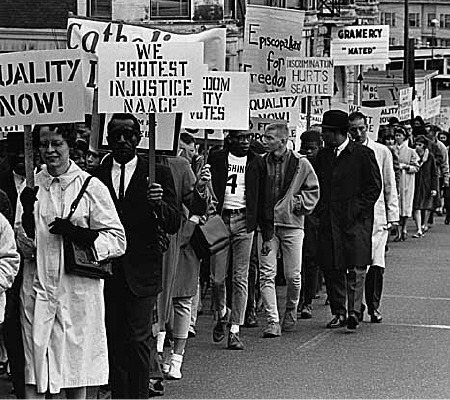So much has happened recently, that I couldn’t decide what
to write about for this blog post. The Wendy Davis ruling managed to get a few
paragraphs written about it before I changed my mind. The privatisation of
student loans nearly received a mention, but I think it’s a little too early for
me to say anything concrete. I haven’t read enough on the “concentration camps”
in Greece to write much, and the Stephen Lawrence/police spies overwhelms me a
little. So I decided to write about something not so big here in the UK, the
supreme court ruling in the US that meant a 50-year-old civil rights law was
struck down by the supreme court, which will leave minority voters unprotected.
If you’ve never heard of the law and don’t know what this
means, like me until a few days ago, let me quickly explain. The 50-year-old
law, which some say was the most important civil rights law ever passed by
congress, prevented states with backgrounds of racial discrimination from
making any changes to electoral rules without seeking permission form the
federal authorities. For example, this meant they could not suddenly introduce literacy
tests that would prevent many minority voters from registering .
The reason given for striking down the law was that racial
discrimination in the south was just not significant today. On a completely unrelated
note, loved and admired Southern TV chef Paula Deen admitted to using “n****r”
more than once, and expressed a wish to throw a plantation-themed wedding
party, complete with black slaves.
Gary Younge wrote an excellent article for the Guardian,
where he puts into words so succinctly something I’ve been trying to express
for a long time now; “racism is now more subtle, not that it has disappeared.
They have taken down the offensive signs but continued the offensive practice”.
I keep trying to tell people, just because the USA has a black president, and
black people aren’t being lynched anymore, it doesn’t mean racism is
effectively over. Replacing these old, racist practices are more subtle ones.
You don’t call people “n****r” these days (unless you’re Paula Deen of course),
now you introduce cuts and withdraw laws that just so happen to affect
minorities as a by-product.
The impact of this issue has been rather cushioned by the
Wendy Davis filibuster. Of course, it’s obvious why. Nobody stood on a podium
and argued for minority rights for 11-hours, the offending party (the
republicans) were not defeated. Here in the UK, the ruling barely made the news
because it quickly happened with no opposition. Simply: “by the way, minority
groups are no longer protected, racism is over, have a nice day” and that’s all
the attention the case receives.
I can possibly pin down the reason for my being so annoyed
as a result of my recent reading. For my dissertation I started reading
Caribbean literature and about the experience of black people in the UK. As a result
I’ve read about events like this new ruling happened again and again that were
supposedly not racist. I’m annoyed because no matter how many times people say
it, racism isn’t over. We can’t just forget what happened in the past, as I
seem to see many people claiming in their “but slavery was ages ago!” speeches.
I did want to write about the Wendy Davis filibuster, as it
was a big step in the feminist movement. However, I feel the minority ruling
was so important to talk about, not because of any difference in importance,
but because I felt that the media attention that case has received, and
continues to receive, is already sufficient. Now, if Rick Perry goes ahead and
somehow passes the anti-abortion law anyway, people will know about it. I feel
that because the minority ruling deserves more attention, as I’ve seen very
little about it here in the UK. If a state suddenly excluded a minority group
from voting through a change in electoral rules, we’d probably not know about
it unless we were the victims of it. And that, is a rather sad state of
affairs.
-Khia


